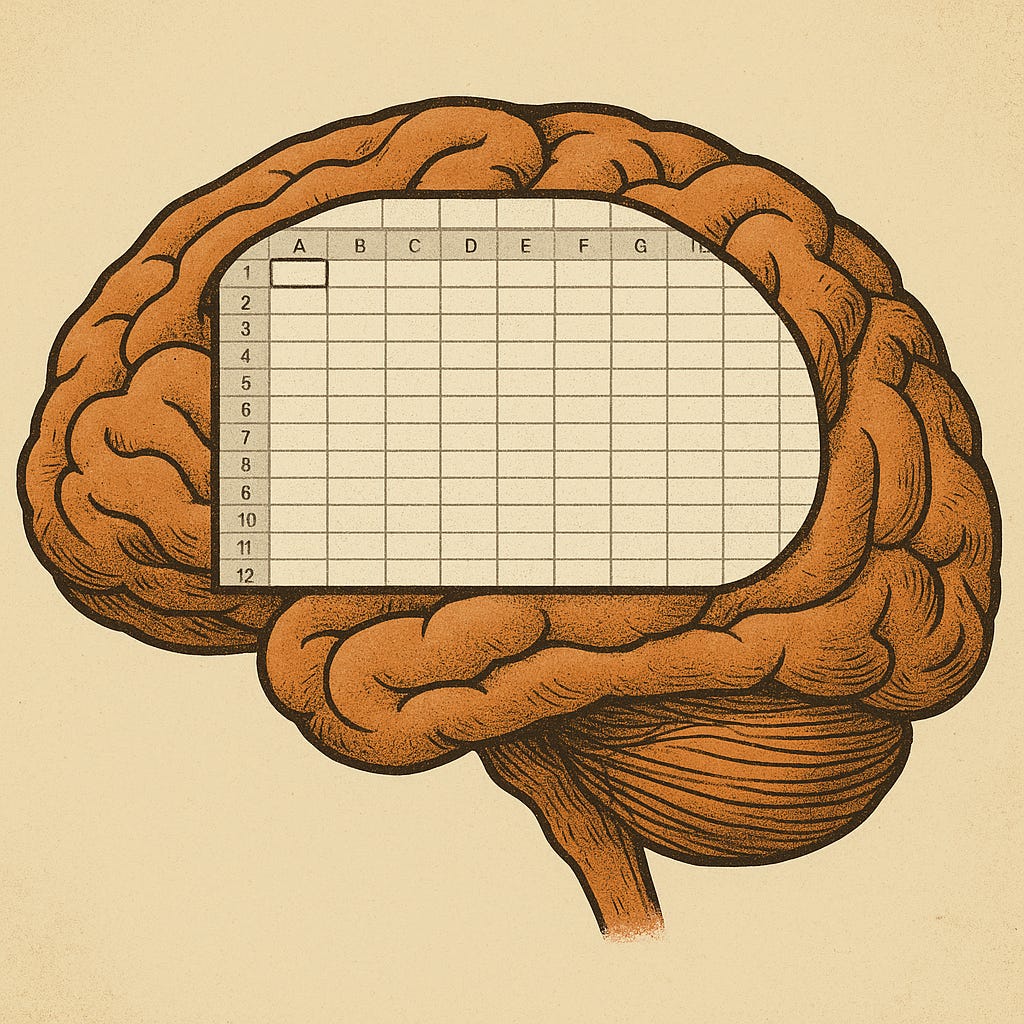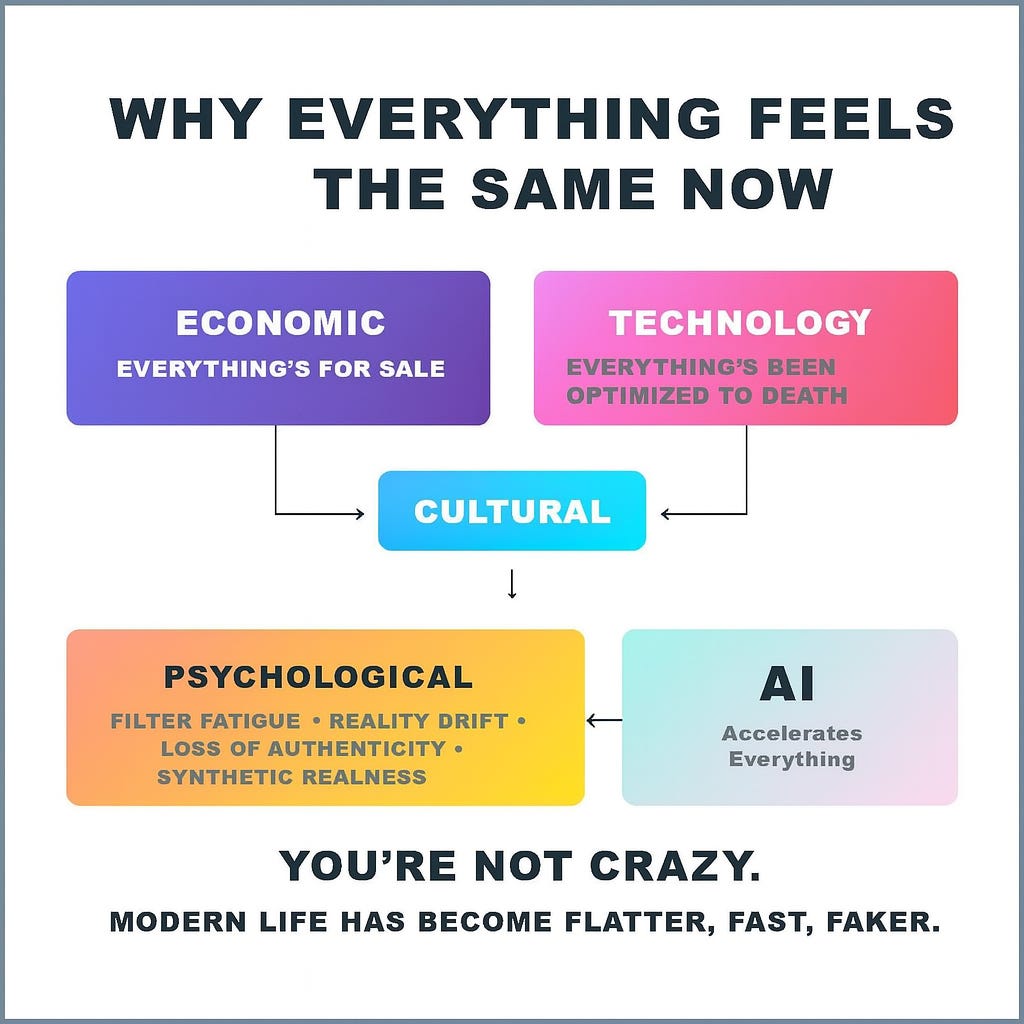The Optimization Trap: Why Late-Stage Culture Feels So Exhausting
How We Engineered the Human Out of Being Human
Part 3: The Optimization Trap → why modern life feels hollow
Weekly essays on why everything feels fake—and what we can do about it.

The Algorithm Inside Our Heads
I was at a BBQ a few weeks ago when Amazon Prime Day came up in conversation. Not once, but three different times. I realized we'd all been tricked into stocking up on baby supplies for our new kids. Even though we all sort of knew the deals weren't that great.
That's when it hit me, we've all fallen deep into what I call the optimization trap.
Here's the thing: it wasn't just that we got played by Amazon's marketing. It's that we'd all internalized the optimization mindset so completely that we automatically started calculating whether we were "winning" or "losing" at Prime Day. We couldn't just... not participate. The algorithm had gotten inside our heads.
This is everywhere now. Education teaches self-optimization instead of understanding. Parenting has become about milestones and metrics rather than just paying attention to your kid. We post pictures of our "perfect" vacations while secretly calculating engagement rates.
We live in a constant state of what I've started calling filter fatigue: the exhaustion that comes from endlessly curating, comparing, and choosing. This is why everything feels a little bit fake.
When Efficiency Becomes Emptiness
At first, optimization seems helpful. Technology makes life more efficient, right? And that might've been true when optimization came in slow, human-sized steps. But AI doesn't just continue the trend, it industrializes it. Hyper-personalized, always-on, invisible optimization that rewires your defaults without you noticing.
The optimization mindset has crept into every corner of life, and it's creating some weird psychological effects.
You become the project manager of your own personality. Treating yourself as a product instead of a person. You're not experiencing life, you're evaluating it. There's always another thing to optimize, another benchmark to beat, another version of yourself to become.
You lose your intuition. When everything gets filtered through frameworks and metrics, you forget how to trust your gut. The monetized mind kicks in everywhere: Can this hobby become a side hustle? Can this thought go viral? Even downtime gets filtered through optimization frameworks.
You get afraid to be a beginner. It's hard to pick up the guitar for the first time when you go on YouTube and watch some fourteen-year-old who claims to be world-class after playing for just a year. Everything gets compared. Everything becomes a metric. People are afraid to fail, so they don't even start.
This is the psychological cost of the optimization trap: perpetual incompleteness. No finish line. No point of arrival. Just endless self-improvement that somehow makes you feel worse about yourself.
The Great Flattening
All of this optimization is changing culture in ways that are hard to put your finger on. Kyle Chayka nailed something in Filterworld - there's a reason you can fly anywhere and every coffee shop has the exact same aesthetic. But here's what I think he missed: it's not just that algorithms shape what we see. It's that they're shaping how we think and feel.
Everything has started to converge into the same narrow range of expression. It's not just that we see different things in our feeds. It’s that everything starts to feel the same emotionally, aesthetically, even semantically. It goes much deeper than visual sameness, it's cognitive and emotional convergence.
I've started calling this "the great flattening." Big companies and big tech platforms need everything to be scalable, predictable, and brandable. AI is only going to speed this up.

Think about it: National holidays turn into shopping occasions, while shopping events like Black Friday become our real holidays. The only shared cultural experiences left are either buying things or performing patriotism. Corporate speak leaks into how we all talk. Everything feels curated, polite, and just... okay.
That feeling you recognize but can't quite name? That's reality drift. It's what happens when optimization becomes the default mode of existence.
Optimized Intimacy
Even the most intimate parts of life haven't been spared. I feel bad for my friends still dating. One of the most fun, exciting, scary, and human things you can do has gotten sucked into "big optimization."
Dating becomes about optimizing profiles, strategies, and "openers." Romantic connection becomes a conversion funnel—optimized for clicks, not chemistry. What you get is synthetic realness: interactions that feel authentic but are engineered for engagement
Travel got the same treatment. I was having dinner with a college friend recently when we realized we were both planning to visit Petra in Jordan. Out of all the things to do and see in the world, my close friend and I happened to both be planning to visit the same country to see the same ancient city.
I found that strangely unsettling. There's so much to explore out there. But we're all drawn to the same handful of places. Sort of exotic, but not unsafe. Places with good tourism infrastructure so you can get that perfect shot for Instagram. The picture where you crop out the long lines of tourists and the sweat on your back. We've optimized the mystery and spontaneity right out of discovery.
The Way Out (But Not What You Think)
Here's what I keep coming back to: the solution isn't better optimization. It's not life hacks or productivity systems or frameworks for being more authentic. The way out is simpler and harder than that.
Create zones in your life with no analytics. No metrics. No optimization. Not everything needs to be improved. Sometimes the most radical act is sitting in your backyard, doing absolutely nothing productive, watching the light change, and remembering what it feels like to simply exist.
Embrace being terrible at things. Get on stage at open mic night and embrace the mistakes. Bake something badly. Grow something that might die. Use your gut instead of spreadsheets. The optimization trap promises efficiency but delivers exhaustion. The antidote is remembering that the most meaningful parts of being human can't and shouldn't be optimized.
Seek out genuine randomness. Get lost on purpose. Let conversations be messy, slow, or completely off-script. Stop trying to curate serendipity, that's a contradiction in terms.
The optimization trap is a systems problem disguised as a personal one. But until we can change the systems, we can at least remember what it feels like to be human instead of a user.
There's no algorithm for aliveness. And that's exactly the point.
Further Resources:
[Optimization Trap - Full Working Paper (Archived)] - Internet Archive



